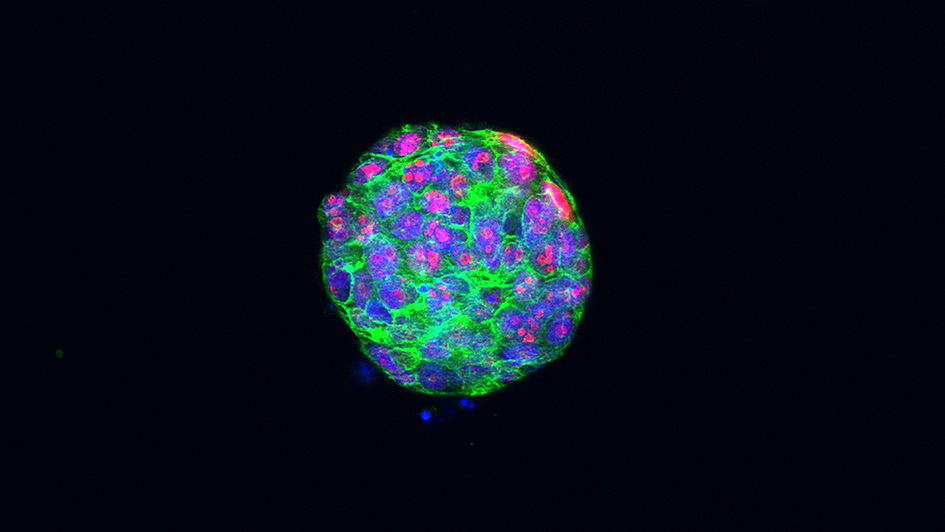
Image: Proliferating cells in a tumour organoid of triple-negative breast cancer. Credit: Dr Rebecca Marlow
Researchers have uncovered a potential cause of sustained resistance to hormone therapy in the most common form of breast cancer.
The majority of breast cancers are hormone receptor positive – these are cancers which have an oestrogen receptor on the surface of the cells. Hormone therapy is an effective treatment, but roughly 40 per cent of women relapse with a form of the disease which proves resistant to available treatments.
Scientists found that breast cancers which had become resistant to hormone therapy have a molecular advantage that helps their cells successfully evade hormone therapies, which are the best treatment option currently available for patients with hormone receptor positive (or ER+) cancers.
Patient-derived xenografts
The study, led by researchers at Department of Experimental and Clinical Biomedical Sciences at the University of Florence, Italy, in collaboration with colleagues at The Institute of Cancer Research, London, has shown that breast cancer cells which are resistant to hormone therapy have more of a microRNA molecule called miR-23b-3p.
MicroRNA is involved in gene expression – controlling whether a gene has an effect or not, and how much – and the researchers found that miR-23b-3p causes a decrease in a type of protein for transporting amino acids which are either alkaline or neutral in pH.
In resistant breast cancer cells, a rise is seen in a different type of transporter which deals with the acidic amino acids – glutamate and aspartate. Cells which are reliant on these acidic amino acids are able to continue to successfully resist hormone therapy treatment.
Scientists in our Division of Breast Cancer Research have been involved in some of the most famous discoveries in the history of breast cancer research. Learn how the ICR is tackling the most common type of cancer among women, which affects around one in eight women in their lifetime.
In this study, which was published in Cell Reports and funded by Associazione Italiana per la Ricerca sul Cancro (AIRC) and Fondazione Umberto Veronesi, researchers used multiple models of cancer including the so-called patient-derived xenografts, which originate from a patient but are then implanted into a mouse model to aid their study and monitoring.
This allowed for careful and thorough experimentation on naturally growing cancers and provides data which is relevant for the original patient.
By looking at the expression of all of the genes in the cancer cells, scientists could point out which substances were being made in excess, and which substances were made in shorter supply.
Analysis of these results led to researchers painting a picture of which molecules the cancer cells were reliant on as fuel sources, and which substances cells were not able to make use of.
Cells unable to transport neutral and basic amino acids become forced to rely on their acidic counterparts.
Predicting the likelihood of relapse
The scientists then showed that increasing the levels of aspartate and glutamate in ER+ breast cancer cells was related to the development of resistance to endocrine therapy.
What’s more, shutting down the cells’ ability to move aspartate and glutamate inside the cell reduced the ability of endocrine therapy resistant cells to spread, proving that there is a robust relationship between these molecules and the cancer cells’ ability to survive and thrive.
Dr Andrea Morandi, an Assistant Professor of Biochemistry and Group Leader at the University of Florence, who led the research and was previously a postdoctoral fellow in the Division of Breast Cancer Research at the ICR, said:
“It was great to collaborate with colleagues at the ICR on this paper to examine the factors that drive resistance in breast cancer in the experimental setting.
“We know that 40 per cent of patients with this cancer who respond to treatment will go on to relapse with a form of the disease that is resistant to all available treatment options. Uncovering the molecular basis of this is a critical step in towards understanding what helps drive cancer’s resistance to treatment.
“In the future we hope this research will provide valuable information to help predict the likelihood of relapse in patients with hormone therapy-resistant cancers, as well as providing insight into a potential new way to treat these cancers.”
Development of resistance in some patients
Dr Lesley-Ann Martin, former Group Leader in Endocrinology and the lead ICR researcher on the study, said:
“This analysis gives information about the key molecular players involved in ER+ cancers which are resistant to the current front-line treatments in our experimental settings.
“Further work will determine whether the findings presented in this work have significance in the clinic for predicting the best treatment courses for patients, and the potential for the development of resistance in some patients.”
